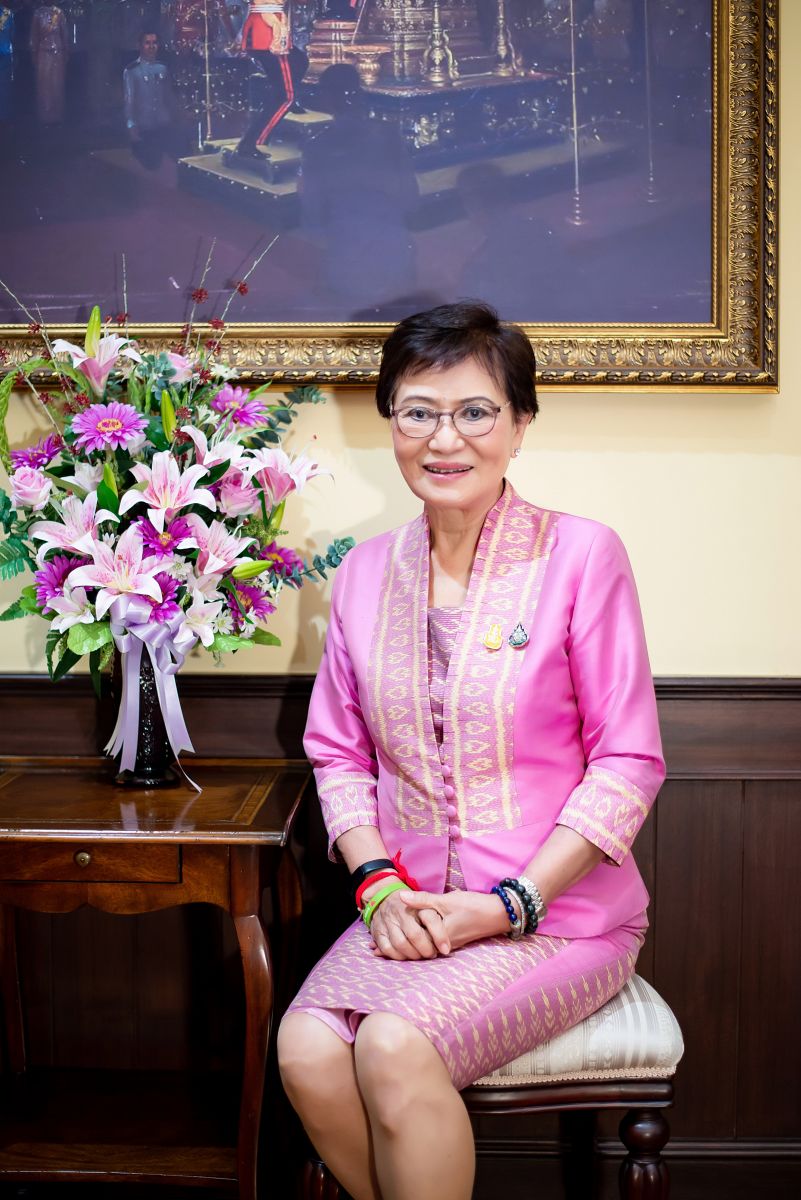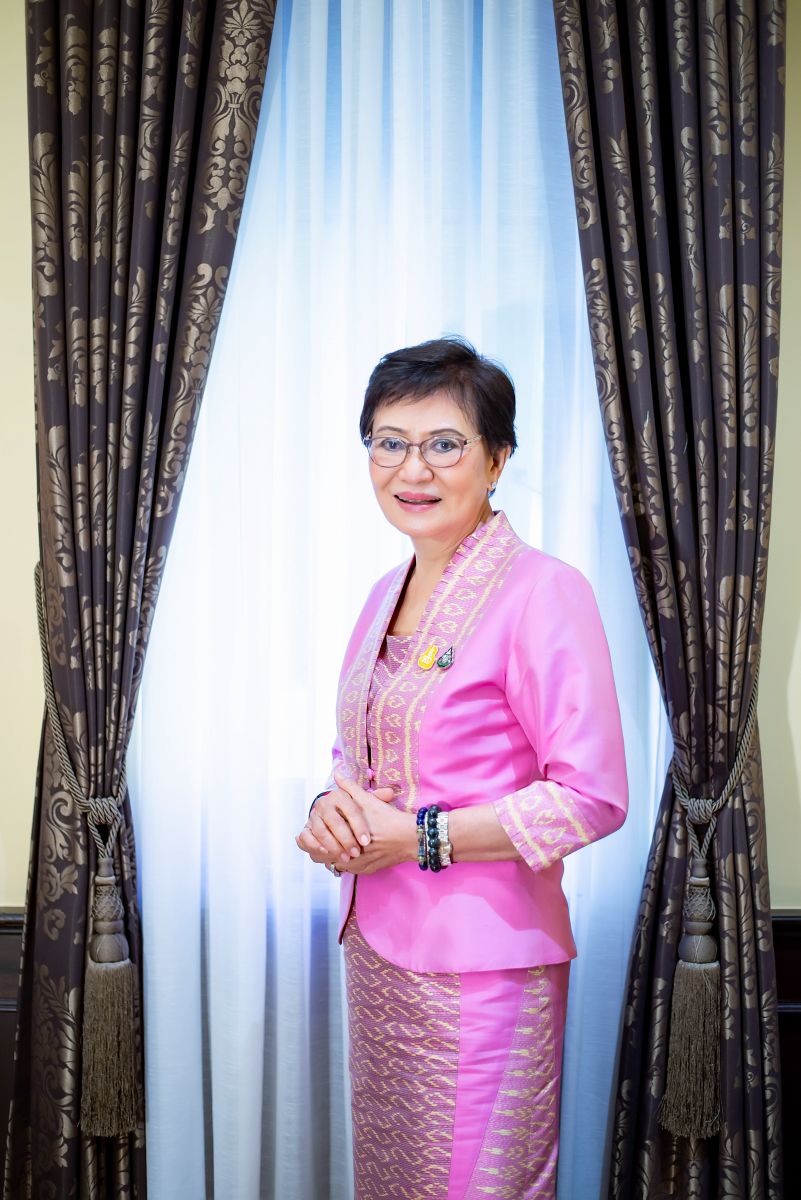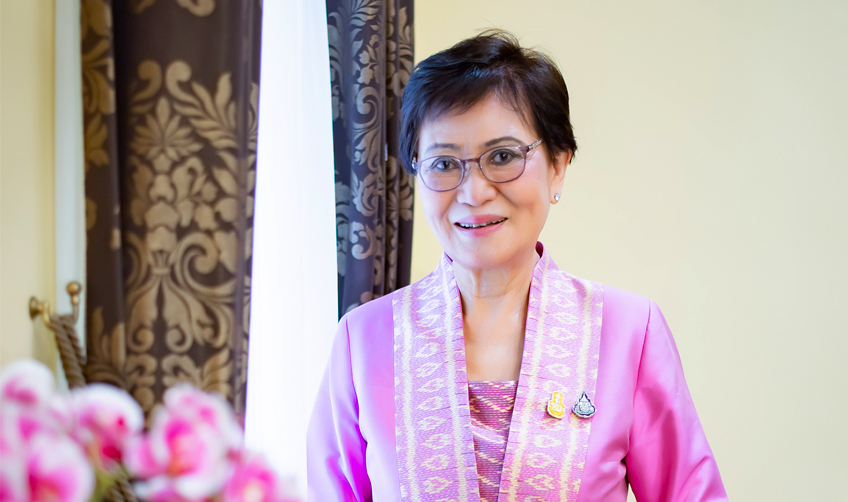Khunying Kalaya Sophonpanich, PhD, the Deputy Minister of Education, has devoted herself to improving the quality of life for all members of Thai society following her graduation from the Faculty of Science, Chulalongkorn University with a BSc (Honours) in Physics and then a PhD in High Energy Nuclear Physics from Imperial College, London.
She began her career as a lecturer at the Faculty of Science, Chulalongkorn University and has remained very active in education and academic development. Between 1985 and 2000, she was a member of the Board of Directors of Computer Software Training, as she began to formulate the current policy, “Coding for All” that has been instituted and is now being promoted by the Ministry of Education, in conjunction with a number of other related ministries, departments and agencies.
Khunying Kalaya has also been instrumental in spearheading environmental conservation. She founded the Rajapruek Institute Foundation in 1986 of which she is still the chairman. The foundation has as its mission the conservation and restoration of natural resources and forestlands as well as the cultivation of new generations of environmentalists who will strive to protect and be responsible for the ecosystem. Therefore they organize youth leadership development projects along with fun and challenging activities under the concept “Building Forests by Building People” while at the same time promoting ecotourism as a way to connect families to engage in activities to encourage active environmental conservation. The thinking behind this quite successful promotion is based on the theory that lifetime habits are formed during childhood and that children can influence their parents' adoption of these principles and behaviour.
Khunying Kalaya has said she developed this understanding while raising four children and watching her grandchildren now grow up together with her husband, Chote Sophonpanich, the former senior executive vice president of Bangkok Bank PCL. Bangkok Bank has also adopted this philosophy of contributing to education and community development by building as many as 31 schools in 30 provinces nationwide during the past 47 years as well as, in collaboration with Praphansarn Publishing House, donated books to primary school libraries since 2009 to help develop the imagination of students. At the same time, the bank has been helping to educate children in the importance of saving, which can serve as an influencing behaviour on their parents.
After running for Bangkok governor unsuccessfully, Khunying Kalaya was elected to Parliament in 2008 as a member of the Democratic party and was appointed Minister of Science and Technology. Now, with her vast knowledge and experience in science, technology, the environment and education, Khunying Kalaya is again working to prepare and help lead Thailand into the “Digital Era” introducing a number of policies centred around “Coding for All”, which, taking time from her busy schedule, Khunying Kalaya was very kind to discuss with Elite+ at her offices in the Ministry of Education.

To begin, could you explain the concept of “Coding for All”?
Let me start by saying the term coding can be thought of an acronym with the letter “C” standing for Creative Thinking; “O” representing Organised Thinking; “D”, Digital Literacy; “I” Innovation; “N”, Newness and “G”, Globalisation or Growth Mindset, which are all required skills for the 21st century.
As we entered the new millennium, first, the term “Digital Era” became prevalent, but now, we are hearing the expressions, “Disruptive Era” and “Disruptive Innovation”, more and more. This can be interpreted as technology is moving much faster than society, education and business can adapt as traditional value indicators are altered. We must, therefore, prepare our youth to be capable to tackle new challenges as well as educate their parents.
As we continue to teach in our schools the essential learning tools, literacy, i.e., reading and writing, along with oral expression, numeracy and problem solving, we need to teach a third language in addition to Thai and English, which is Coding. But this doesn’t mean just programming as I explained what the acronym comprises earlier. We now need to teach our children to think critically, to come up with the most practical solutions when faced with a problem. We call this “Unplugged Coding”. At the same time, in some pilot schools, we have begun instructing primary school students, Prathom 1 to 3, in computer coding.
Can you explain more what you mean by “Unplugged Coding”?
During the first phase of this “Coding for All” initiative, we don’t need computers or other digital devices. What we have been doing is training teachers to teach their students coding concepts that can improve their creative and logical thinking. Initially, in 2019, before the Covid-19 pandemic led to the implementation of classroom restrictions, we trained 1,000 primary school teachers during a three-day camp led by specially trained experts from the Institute for the Promotion of Teaching Science and Technology (IPTST). Once they completed the course, these teachers became master trainers to share their knowledge with teachers at over 30,000 schools nationwide. After the Government imposed lockdowns in early 2020 and we had to adapt education to online platforms, we began to train primary and secondary (prathom and mathayom) school teachers through our online “Coding for Teacher Plus” programme, and as many as 300,000 have now completed this programme and blended this concept into the curriculum the subjects they are teaching.
While these ideas may sound innovative, we are actually striving to catch up with countries like South Korea that introduced coding into their curriculum in 2007, followed by the UK that made this a mandatory curriculum in 2014 and Japan that adopted this as a compulsory subject in 2020.
We have also introduced this concept into community development. At some of our more remote schools under the Office of the Basic Education Commission (OBEC), in collaboration with the Institute for the Promotion of Teaching Science and Technology (IPST), we have been teaching “Unplugged Coding” in a way that it integrates with the local community economy, for example, “Coding for Shrimp Paste” production in the community of Khlong Khon in Samut Songkhram province and “Coding for Handwoven Fabrics” preservation, which also aims to increase secondary income for local communities in the north and northeast.
What we are teaching and encouraging is systematic thinking, to do things in the right way, step by step, to find the best, most practical solution to a problem. In other words, we are reemphasising the concept of the “Scientific Method”, which comprises six steps: first, asking a question and then conducting research about what is already known about the subject. After this, a solution is proposed and tested and the results analysed. If the results are unsatisfactory, improvements can be tried until you are happy with the end result.
Is this similar to the STEAM concept you are now promoting?
Not directly, but when we teach the integrated academic disciplines science, technology, engineering and mathematics, or STEM, students learn about problem solving, and what we are trying to do is prepare them for the new challenges they will face, especially in technological advancements, as I mentioned earlier. The problem is, I believe, this isn’t enough. So, we are now promoting STEAM, adding to the subjects “A” that signifies the Art of Life. Students must also be taught and encouraged to use their imagination, to take what they have learned to a new level or in a new direction. As Albert Einstein said, “Imagination is more important than knowledge. For knowledge is limited to all we know and understand, while imagination embraces…all there will be to know and understand.” By combining science, technology and innovation, or STI, with art, transforming STEM to STEAM, we can expand students’ vision and their opportunities in the future as we also focus on how STI can be applied to everyday life.
Further, under the A, Art for Life, discipline we can also incorporate Thai culture into the formula. So, as we advance, we still never lose sight of who and what we are.
I do strongly believe that while science, technology, engineering and mathematics are important, we need art of life to reach beyond. So, we are again training our teachers in this new, expanded concept and will be incorporating it into school curriculums at all levels, but it will take time. It could take up to four years to introduce this in all our schools nationwide.
Another way I look at A - the art of life - is that we are teaching students the thinking behind soft power and cooperation rather than competition to achieve their goals.
Could you tell us about some of the other policies and projects you have introduced at the Ministry of Education?
We have begun to introduce teaching history through contemporary media. We have produced 10 videos to teach Thai national history that through new technological innovations we can make learning much more fun and interesting. The students are then much more accepting and will remember what they have been taught. Ultimately, I would like to integrate augmented and virtual reality technologies, or AR and VR, into our curriculums. We’ve found the students really enjoy these clips, especially one about our railways and their evolution. We also have three that examine the Sufficiency Economy philosophy introduced by our late King Bumiphol Adulyadej the Great (Rama IX) as it pertains to agriculture. In the future we hope to expand this form of teaching and learning to other subjects, and through these media, we can also focus on developing critical thinking by the questions that are posed. Other classroom activities can then be designed based on what has been presented.
I also understand that you have introduced a community-based water management project that was inspired by King Rama IX’s concern to ensure Thai farmers had sufficient water resources to satisfy their needs. Could you tell us something about this?
Did you know that Thailand is sixth in the world in food production and export? To maintain this position or rise in the ranks, water management is vital. His Majesty was one of the first to realise this and to introduce different measures to alleviate the problems or obstacles many farmers face in accessing the water they need. King Bumiphol Adulyadej collected an immense amount of data to analyse. He wanted to understand where the rain water was going so he could figure out the means to conserve it and assist farmers. He learned that the Royal Irrigation Department and its reservoirs and canals only accounted for 20% of all of Thailand’s water. So, the question was, where did the remaining 80% go. As an agricultural-based country still, even as we have industrialise, a major portion of our population continues to farm and be dependent on water. It’s the lifeblood of our country. So, His Majesty began to promote the sufficiency economy agricultural concept I mentioned that we have begun teaching in our schools, and as I said near the beginning of this interview, if we teach our children, we can influence and educate their parents. Thus, as part of the programme, selected students and young members of different villages are encouraged to develop and submit proposals for water management projects for their communities or schools. This can help cultivate an environmental mindset, develop basic knowledge and ultimately implement local water conservation and management with an aim to also build a learning network about water management across the country. A number of private companies, including Bangkok Bank PCL, Thai Beverage PCL and Suntory PepsiCo Beverage (Thailand) Co, Ltd, have also contributed to these efforts by organizing related projects such as a holding a water management proposal competition, building groundwater banks and watersheds by planting trees as well as conducting training projects under the “Mizuiku Program: Youth Water Education” in five provinces: Bangkok, Ayutthaya, Pathum Thani, Saraburi, and Nakhon Pathom respectively
So, while we teach about agricultural sufficiency under the subject Thai history, we have also introduced a course called “Chonlakorn” to teach water management in communities and develop personnel to take responsibility for these concerns. Colleges of Agriculture and Technology around the country are serving as important learning resources. Our goal is to help farmers to have sufficient water to drink, cook and raise their crops and or animals and solve their problems in a sustainable way. Again, this can be achieved through teaching “Coding for All”. We are also teaching farmers which crops they can plant and harvest based on the amount of water they can access, which can change during the different seasons. Our aim is to achieve food security, self-reliance and the means to a good quality of life based on the principles of sufficiency economy. Using coding, these farmers can find the best solutions based on the situation and conditions they are facing. Our school programme together with community outreach programmes can build an even stronger commitment to these principles.

Has coding been introduced into any other programs?
To meet the needs of the industrial sectors, we have introduced our Science-based Vocational Creative programme that teaches coding to encourage students to earn a Bor Wor Chor, or 12th grade Vocational Certificate, and Bor Wor Sor, 14th grade Technical Diploma. By promoting coding and STEAM curriculums, we can produce graduates who can satisfy the demands of manufacturers and companies involved in the service industries. Every one of these graduates is virtually assured a job after successfully completing their programme. There are more positions now then graduates, and so their opportunities are vast. At the same time, we have as many as 500,000 students graduating with Bachelor degrees, and there are not nearly enough jobs for all of them. Germany has been so very successful in a similar endeavour. New graduates have jobs, and the companies have the personnel they need. We need to follow this example to develop and have the qualified human resources required to continue to advance, especially in this disruptive technology era.
At the same time, the ministry is expanding an Equitable Education Programme to create opportunities for underprivileged and disabled children. Again, as we become more technology dependent, following training, these students can enter the workforce and enjoy a more normal life in the future.
As we conclude our interview, is there any final thoughts you would like to leave with our readers?
As I said at the start, we must teach our children how to think, or what I call Coding. From Unplugged Coding, and systematic critical thinking, they will gain the foundation upon which they can move into the more technological realms and become coders and programmers. But, I know this is not for everyone, and this is again why I have added A – the Art of Life – into all curriculum development. By giving our children well-rounded, critical thinking minds, I believe Thailand can take its place among the advanced, industrialised countries of the world.














































































































































































































































































































































































































































































































































































































































































































































































































